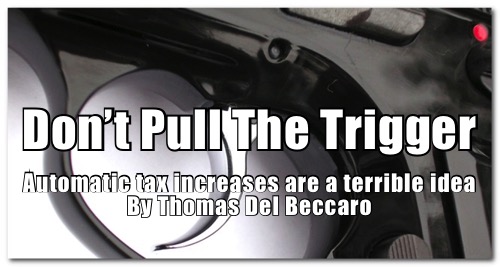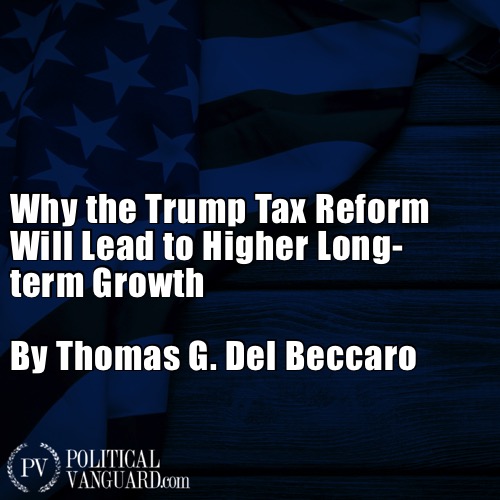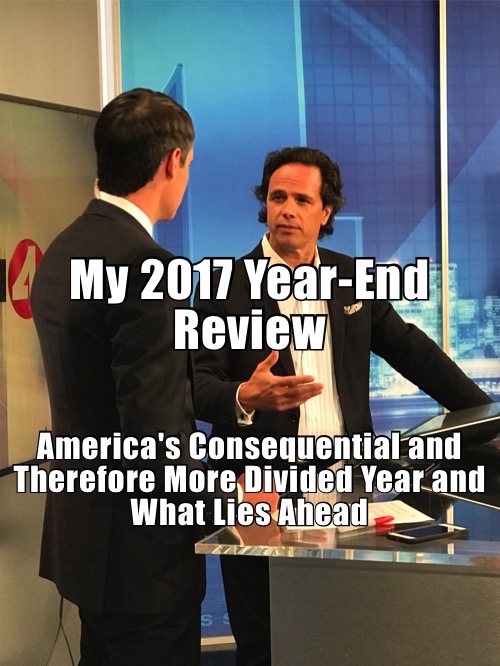Don’t pull the trigger . . . Corker, Flake and Lankford Are Wrong Again
Once again, a few Senate Republicans are just plain wrong when it comes to tax policy.
Previously. some supported delaying the corporate tax reforms. Such a delay is a bad idea for the reasons I wrote here – Don’t Delay.
Now, according to Politico: “a handful of deficit hawks — including Corker and Sens. Jeff Flake of Arizona and James Lankford of Oklahoma — are discussing a trigger mechanism that would kick in and potentially change tax rates if the economic growth needed to defray the cost of the tax overhaul doesn’t materialize.”
As for the issue of deficits, I wrote this: It’s The Spending – Politicians and Spending.
As for the use of a “trigger,” it demonstrates another complete lack of understanding of economics.
The triggered tax increase would come into play if not enough revenue was being generated by the economy. So, why would an economy not generate enough tax revenue? In today’s world of endless taxation, the only answer is that the economy is weaker than desired.
The answer to a weaker than desired economy, however, is NEVER to take money out of the private sector. Such an answer defies common sense.
Think about it:
- If you do not have enough money, i.e. your economy is weak, is the answer to take money away from you?
- If a store does not have enough revenue, in a weak economy, is it’s answer to raise prices? Or is it to put items on sale to lure in customers and generate revenue?
The same concepts apply to the economy as a whole.
As I wrote in Forbes in 2012,
“Raising taxes during bad economic times is much like throwing more weight on a overburdened mule; it slows it down even more. For government, economic downturns mean less business transactions and less income, which, of course, means less tax revenue.”
I went on to note that John Maynard Keynes “well understood the concepts above. That is why he wrote long ago:
‘Nor should the argument seem strange that taxation may be so high as to defeat its object, and that, given sufficient time to gather the fruits, a reduction of taxation will run a better chance, than an increase, of balancing the budget.’
By writing that, Keynes wanted others to understand that tax policy should be guided to the right level so as to not discourage income but, instead, to maximize income and therefore revenues. Keynes was not finished there, however. He went on to explain:
‘For to take the opposite view today is to resemble a manufacturer who, running at a loss, decides to raise his price, and when his declining sales increase the loss, wrapping himself in the rectitude of plain arithmetic, decides that prudence requires him to raise the price still more–and who, when at last his account is balanced with nought on both sides, is still found righteously declaring that it would have been the act of a gambler to reduce the price when you were already making a loss.'”
During the weak economy of 2012, I concluded like Keynes and any logical economist would know that “No businessperson today would think it logical to raise his prices in the face of declining sales. Quite the contrary, businesses cut prices during slowdowns to increase sales.”
I also wrote that “We should do the same for income by cutting tax rates.”
All of the above applies to the trigger Corker, Flake and Lankford want. It is bad economics and lacks common sense. Again, “Democrats and even some Republicans see deficits and reflexively want to raise prices, i.e. taxes. They take out their calculators and say: we need more money so let’s raise tax rates – much like the failed manufacturer raised his prices in Keynes’ story above.”
On the other hand, it is Washington D.C. where they think they can tax and spend their way to prosperity.
~ ~
Some will read this and recoil at the reference to Keynes. I am not a Keynesian in any regard. His thoughts on tax increases during a weak economy, touted by Professor Arthur Laffer over the years, were correct.
Politicians have grossly overstated what Keynes actually believed. As I wrote in that same 2012 article, Keynes “didn’t want government to be the pump – even if he allowed that government could prime the pump.” Today, Washington is awash with those that believe that government in all of its phases, including spending and the central bank, should be the pump. The last 80 years of policy have demonstrated how very wrong that is. We have a less robust economy and a stagnating standard of living because the total amount of government activities, i.e. spending, taxing, central bank policies and the costs of regulations exceeds 50% of the economy – not because we need to trigger more.







